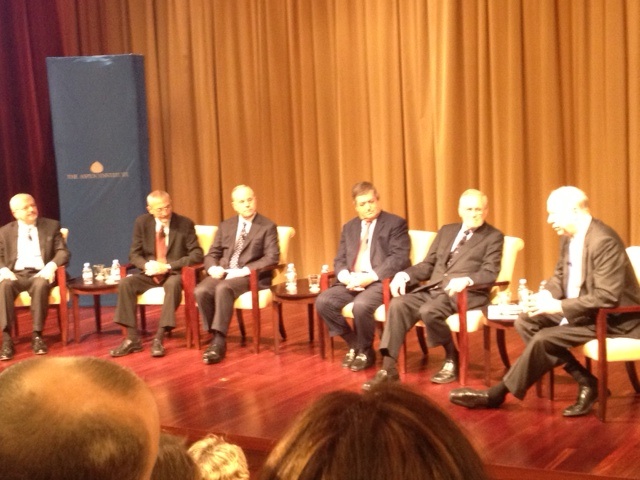
Oh, it was the National Archives in Washington, D.C. last night. There's got to be a joke in there somewhere....
They're all white men, reminding us that Sheryl Sandberg is right: men still rule the world. We hope that will soon change and when I mentioned during the Q&A that I look forward a woman Chief of Staff it drew applause from the audience.

(Photo by Joan Michelson)
This Chief of Staff to the POTUS is a fascinating role. It's not in the Constitution and didn't even exist until World War II, moderator David Gergen pointed out, yet it wields tremendous power.
These five guys -- Donald Rumsfeld, Ken Duberstein, Mack McLarty, John Podesta and Josh Bolten -- painted a rather romantic view of the Chief of Staff (COS) job, which was too bad. Maybe hindsight breeds selective memory? Maybe they were demonstrating their political and diplomatic skills? This event, which was presented as "The Inside View" (by the National Archives and The Aspen Institute) presented a great opportunity to share more insights from the inside, especially since it was moderated by Gergen, who worked for four presidents on both sides of the aisle (including four of the COS's on the panel). Another lost opportunity.
Ken Duberstein, one of President Reagan's former Chiefs of Staff, finally mentioned towards the end of the event that the 16-plus-hour days and loss of family time were grueling (and he was before the 24/7 media cycle!). Working incredibly intense hours with that level of intimacy and pressure must have had "difficult" moments, like a marriage, but unfortunately we didn't hear about those.
Duberstein also explained that the COS has to be "the reality therapist... giving "unvarnished advice" to the POTUS. They all stressed that such advice has to be delivered "the right way" but didn't explain what "the right way" is.
Can You Really Have a Candid Relationship with the President?
A few key points came out in talking about the COS's who didn't last long. For example, as the COS, "you have to exchange views with the POTUS, and therefore had to "have a feeling for the way they think about policy," according to John Podesta, who was one of the COS's to President Clinton. This is where those COS's who had served in the White House with that POTUS and were promoted to COS were at an advantage, Podesta added. Mack McLarty, President Clinton's first COS (and a long-time pal from Arkansas), explained that for the COS to be effective, you have to have an agreement with the president that you have a candid relationship, one-on-one, where you can give the POTUS criticism. "He took criticism very well as long as it was delivered in the right way." So, what's the right way to deliver criticism to your boss who happens to be the President of the United States? Especially when he's, um, how should I put this, not telling you the truth?
Maybe Donald Rumsfeld, COS under President Ford, could have a more candid relationship with Ford because he knew him for many years (from serving together in Congress) and because Ford came to the most powerful position in the land without having been elected either Vice President or POTUS, having been appointed VP after Agnew resigned in disgrace and then of course Nixon did the same. Rumsfeld showed a good sense of humor, maybe in an effort to be a more sympathetic character than we saw during his days as Secretary of Defense under GW Bush, maybe to sell more of his books (a running joke throughout).
Caring About the Country?
Moderator David Gergen asked the audience to remember that "the theatre of politics" we see every day in the media is not the whole picture, but that underneath the antics are people who genuinely care about the welfare of the country. I hope so, but the theatre of the macabre that is the U.S. Congress today, especially the sequester and budget nonsense, don't reflect it.
The eras that spanned the stage represented the evolution of the communications age too. They used to have overnight to control or shape the message, for example, and those days are long gone as the Twitter/social media age has taken over.
Speaking of communications, Podesta noted that "the most important power the president has is to convene the American people and get them focused on what needs to be done." Does the president have that power in the Twitter age?
The COS's gave no insight into how to resolve conflicts between POTUS and Congress to get things done for the country today, they only reminisced about the good ol'days when then-Speaker Tip O'Neill and President Reagan compromised.
Podesta added that the president's authority can circumvent Congress to get things done, as demonstrated by President Obama's announcement yesterday of a project to map the human brain.
So, what else can POTUS do? Remove the economic hardship caused by the sequester?
